Overview: “Prosecute the Profiteers: following the money to support war crimes accountability”
War crimes pay. In East and Central Africa, where armed conflict has created some of the fastest-growing refugee flows in the world, control over lucrative resources is often the raison d’etre of perpetrators. Economic crimes and grave violence often occur in tandem and generate profits for a range of people and entities involved. They entrench the conditions that made exploitation possible, inevitably leading to more. To improve accountability for atrocities, governments, the private sector, and the courts must take aim at the financial infrastructure enabling violence. Authorities in national and international courts should improve their approaches to investigating the financing ...
FEAR, INC.: War Profiteering in the Central African Republic and the Bloody Rise of Abdoulaye Hissène
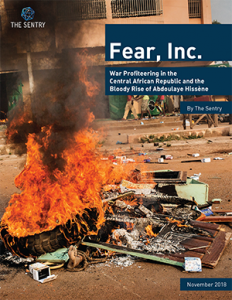
Read the one-pager on The Sentry's latest report ...
Explainer on Multilateral Tools
On Monday, September 10, 2018, the United Nations Security Council hosted a first-ever session on the critical and devastating connection between corruption and conflict. John Prendergast, Enough’s Founding Director and co-Founder of The Sentry, joined UN Secretary-General António Guterres as one of the two featured speakers. This explainer accompanies John Prendergast’s speech to the United Nations (UN) Security Council on September 10, 2018 and further explains the different tools of financial leverage – both at a national level and multilaterally - that can be used to prevent conflict and mass atrocities in Africa. Concepts and processes covered in this document ...
Tools of Trade: U.S. Sanctions Regimes and Human Rights Accountability Strategies
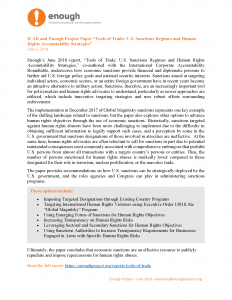
Download the one-pager here. Enough’s June 2018 report, “Tools of Trade: U.S. Sanctions Regimes and Human Rights Accountability Strategies,” co-authored with the International Corporate Accountability Roundtable, underscores how economic sanctions provide financial and diplomatic pressure to further aid U.S. foreign policy goals and national security interests. Sanctions aimed at targeting individual actors, economic sectors, or an entire foreign government have in recent years become an attractive alternative to military action. Sanctions, therefore, are an increasingly important tool for policymakers and human rights advocates to understand, particularly as newer approaches are utilized, which include innovative targeting strategies and new robust efforts ...
Why Sudan Should Not Be Removed from the Terrorism List
The United States is considering next steps, including the removal of Sudan from the State Sponsors of Terrorism List, as part of a path to a full normalization of relations with Sudan in a move that would undermine core U.S. national interests ...
Activist Brief: “Demand the Supply: Ranking Consumer Electronics and Jewelry Retail Companies on their Efforts to Develop Conflict-Free Minerals Supply Chains from Congo”
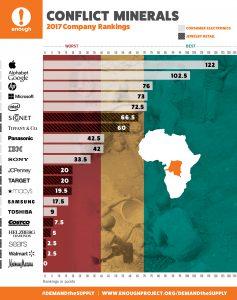
The Enough Project’s 2017 conflict minerals company rankings examine 20 of the largest companies, as defined by market capitalization, in two of the industries which consume the most tin, tungsten, tantalum, and gold: consumer electronics and jewelry retail ...
Activist Brief: Breaking Out of the Spiral in South Sudan: Anti-Money Laundering, Network Sanctions, and a New Peacemaking Architecture
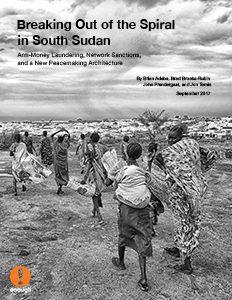
The metastasizing crisis in South Sudan requires a new strategy for achieving a sustainable peace. Conditions on the ground are unbearable for large swathes of South Sudan’s population, and regional peacemaking efforts are not delivering results ...
Activist Brief: “Strategic Pressure: A Blueprint for Addressing New Threats and Supporting Democratic Change in the DRC”
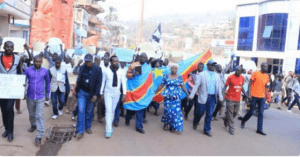
An effective strategy to bring Congo back from the brink of political and economic crisis should focus on achieving a democratic transition while also pushing for key structural reforms and immediate conflict mitigation steps in the Kasai region and the east ...
Progress and Challenges on Conflict Minerals: Facts on Dodd-Frank 1502
Conflict minerals have fueled and continue to help sustain armed violence in eastern Democratic Republic of Congo, linking them to the deadliest conflict globally since World War II. The four conflict minerals (gold, along with the 3Ts – tin, tantalum, and tungsten) are not the only sources of income to armed groups, but they are some of the most lucrative ...
7 U.S. Organizations Urge Secretary Tillerson to Consider Issues Relating to Religious Freedom and the Persecution of Religious Minorities in Sudan
In a joint letter, faith-based and human rights groups warn that religious and ethnic minority groups and faith-based charitable organizations in Sudan face discrimination, detention, violence, and the destruction of churches by the regime in Khartoum ...

